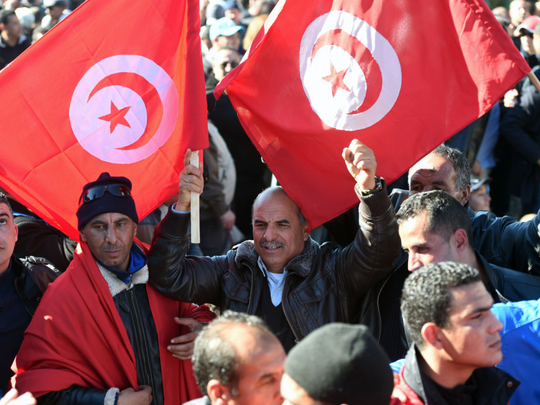
The governments who ruled Tunisia before January 14 and all the governments that followed did not understand the indicators pertaining to public tension and anger, said Tunisia’s Al Chourouk. “Five years later and the Tunisians are now realising the magnitude of the lies and false promises. Realistically, nothing has changed as corruption, poverty and unemployment rates continue to rise. Massive projects are nowhere in sight and the quality of infrastructure is declining in various neighbourhoods and cities. Moreover, institutions are bankrupt and the tourism sector has collapsed. There is one final chance for the Tunisian government and Prime Minister Habib Essid to address these issues, or they will be facing very difficult circumstances and the overwhelming anger of the people. The real test begins now.”
The Tunisians have once again taken to the streets, determined that their voice would reach the current regime and the entire world, said the London-based Pan-Arab newspaper, Al Quds Al Arabi. “The political leaders and security personnel responded to these protests in a way that we hoped we would never witness again. Despite the fact that the political leaders are capable of identifying the issues and their causes, they resorted to accusing one another without providing any actual solution. The Tunisian President, Beji Caid Al Sebsi, hit the nail on the head when he said that this movement began in deprived areas, adding that this is a natural response from people demanding jobs. Such a sound observation was rendered insignificant when Al Sebsi also accused Daesh [the self-proclaimed Islamic State of Iraq and the Levant] of exploiting the situation, bearing in mind that Daesh is not an organisation that believes in the act of ‘protests’ and it is insulting to associate or link Daesh with the needs of the protesters.”
The saying ‘he who has nothing, can offer nothing’ is one that applies to the Tunisian regime during the past few years, said UAE’s Al Khaleej. “The protests throughout Tunisia during the past few days is a natural response to the Tunisian citizens’ current state of frustration. Five years later, Tunisians are still suffering from a true social tragedy. Nothing has changed since the revolution and the economic crisis is tightening the noose on Tunisians, while unemployment rates are steadily rising and the regime is unable to meet the minimum living requirements.”
Meanwhile, despite the legitimacy of this popular movement, there are terrorist and extremist groups that wish to destroy Tunisia by committing acts of destruction.”
The current protests coincide with the fifth anniversary of Tunisia’s revolution, which might not be coincidental, said the Saudi Gazette. “The anniversary was supposed to remind Tunisians that they had proclaimed a democracy, but the demonstrations are also obviously meant to show the authorities that freedom does not necessarily translate to bread on the table. There has been agreement that more than 6,000 jobs will be given to people from the northern town of Kasserine where the protests over youth unemployment have spread to towns and cities. But that is simply a first-aid bandage ... The political transition may have succeeded, but the economic side has not.”




_resources1_16a31069e4e_small.jpg)






